Policies
- Basic build blocks for the different layers of trust
- Define which actions are allowed on which resources
- Can be defined realm wide or node specific
- Are programmatically evaluated

More info
Policies form the basis of autonomy for each resource and node. They define what needs to be done or what is permitted on specific resources and can be integrated on a resource, group, node or realm level. These form the building block of the different layers of trust inside a p2p network. Because different institutions or consortia have different constraints, a defined set of policies is defined for each realm. This can include replication policies for data or metadata and policies that deny for example specific actions for specific nodes. The resulting flexiblity allows for example differentiation between higher-trust nodes, included in access-constrained compute environments that still can participate in a realm and the p2p network. Programmatic definition allows for maximum flexibility at the definition level and ensures that even complex scenarios are covered.